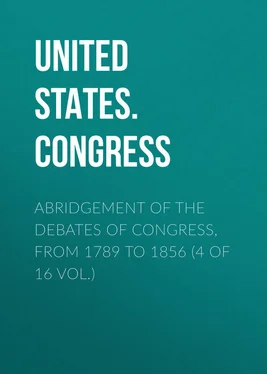United States. Congress - Abridgement of the Debates of Congress, from 1789 to 1856 (4 of 16 vol.)
Здесь есть возможность читать онлайн «United States. Congress - Abridgement of the Debates of Congress, from 1789 to 1856 (4 of 16 vol.)» — ознакомительный отрывок электронной книги совершенно бесплатно, а после прочтения отрывка купить полную версию. В некоторых случаях можно слушать аудио, скачать через торрент в формате fb2 и присутствует краткое содержание. Жанр: Политика, foreign_edu, на английском языке. Описание произведения, (предисловие) а так же отзывы посетителей доступны на портале библиотеки ЛибКат.
- Название:Abridgement of the Debates of Congress, from 1789 to 1856 (4 of 16 vol.)
- Автор:
- Жанр:
- Год:неизвестен
- ISBN:нет данных
- Рейтинг книги:3 / 5. Голосов: 1
-
Избранное:Добавить в избранное
- Отзывы:
-
Ваша оценка:
- 60
- 1
- 2
- 3
- 4
- 5
Abridgement of the Debates of Congress, from 1789 to 1856 (4 of 16 vol.): краткое содержание, описание и аннотация
Предлагаем к чтению аннотацию, описание, краткое содержание или предисловие (зависит от того, что написал сам автор книги «Abridgement of the Debates of Congress, from 1789 to 1856 (4 of 16 vol.)»). Если вы не нашли необходимую информацию о книге — напишите в комментариях, мы постараемся отыскать её.
Abridgement of the Debates of Congress, from 1789 to 1856 (4 of 16 vol.) — читать онлайн ознакомительный отрывок
Ниже представлен текст книги, разбитый по страницам. Система сохранения места последней прочитанной страницы, позволяет с удобством читать онлайн бесплатно книгу «Abridgement of the Debates of Congress, from 1789 to 1856 (4 of 16 vol.)», без необходимости каждый раз заново искать на чём Вы остановились. Поставьте закладку, и сможете в любой момент перейти на страницу, на которой закончили чтение.
Интервал:
Закладка:
The propriety of doing this is now under discussion. The proposition is a naked one; it is unconnected with ulterior measures; and gentlemen who vote for its repeal ought not to be considered as averse from, and they are not opposed to, the subsequent adoption of such other measures as the honor and the interest of the country may require.
In considering this subject, it naturally presents itself under three distinct heads:
1st. As it respects the security which it gave to our navigation, and the protection it offered our seamen, which were the ostensible objects of its adoption.
2dly. In reference to its effect on other nations, meaning France and Great Britain, in coercing them to adopt a more just and honorable course of policy towards us: and,
3dly. As it regards the effects which it has produced and will produce among ourselves.
In thus considering it, sir, I shall only make a few remarks on the first head. I have no desire to indulge in retrospections; the measure was adopted by the Government; if evil has flowed from it, that evil cannot now be recalled. If events have proved it to be a wise and beneficial measure, I am willing that those to whom it owes its parentage should receive all the honors that are due to them; but if security to our navigation, and protection to our seamen, were the real objects of the embargo, then it has already answered all the effects that can be expected from it. In fact, its longer continuance will effectually counteract the objects of its adoption; for it is notorious, that each day lessens the number of our seamen, by their emigration to foreign countries, in quest of that employment and subsistence which they have been accustomed to find, but can no longer procure, at home; and as it regards our navigation, considered as part of the national property, it is not perhaps very material whether it is sunk in the ocean, or whether it is destined to become worthless from lying and rotting at our wharves. In either case, destruction is equally certain, it is death; and the only difference seems to be between death by a coup de grace , or death after having sustained the long-protracted torments of torture.
What effect has this measure produced on foreign nations? What effect has it produced on France?
The honorable gentleman from Connecticut has told you, and told you truly, in an exposé presented by the French Minister of Foreign Affairs to the Emperor, that this measure is much applauded: it is called a magnanimous measure of the Americans! And in a conversation which is stated to have passed recently at Bayonne, between the Emperor of France and an American gentleman, it is said, and I believe correctly, that the Emperor expressed his approbation of the embargo. I have no doubt that this is the fact; the measure is too consentaneous with his system of policy, not to be approbated by him. So long as the extreme maritime preponderancy of Great Britain shall continue, with or without the existence of an American embargo, or with or without the British Orders in Council, France can enjoy but very little foreign commerce, and that little the Emperor of France would undoubtedly be willing to sacrifice, provided that, by so doing, he could insure the destruction of a much larger and more valuable amount of British and American commerce.
It is therefore apparent, that this measure, considered as a coercive measure against France, is nugatory in the extreme.
What, sir, are, or have been its effects on Great Britain?
When the embargo was first laid the nation were alarmed. Engaged in a very extended and important commerce with this country, prosecuted upon the most liberal and confidential terms, this measure, whether considered as an act of hostility, or as a mere municipal restrictive regulation, could not but excite apprehension; for most of our writers, in relation to her colonies, had impressed the belief of the dependence of the West India settlements on the United States for the means of subsistence. Accordingly, for several months after the imposition of the embargo, we find it remained an object of solicitude with them, nor have I any doubt that the Ministry, at that time, partook of the national feeling; for it appears, so late as June, that such a disposition existed with the British Ministry, as induced our Minister at the Court of London to entertain the belief, and to make known to his Government the expectation he entertained, that an adjustment would take place of the differences between this country and Great Britain.
But, sir, the apprehensions of the British nation and Ministry gradually became weaker; the embargo had been submitted to the never-erring test of experience, and information of its real effects flowed in from every quarter.
It was found that, instead of reducing the West Indies by famine, the planters in the West Indies, by varying their process of agriculture, and appropriating a small part of their plantations for the raising of ground provisions, were enabled, without materially diminishing their usual crops of produce, in a great measure to depend upon themselves for their own means of subsistence.
The British Ministry also became acquainted about this time (June) with the unexpected and unexampled prosperity of their colonies of Canada and Nova Scotia. It was perceived that one year of an American embargo was worth to them twenty years of peace or war under any other circumstances; that the usual order of things was reversed; that in lieu of American merchants making estates from the use of British merchandise and British capital, the Canadian merchants were making fortunes of from ten to thirty or forty thousand pounds in a year, from the use of American merchandise and American capital: for it is notorious, that great supplies of lumber, and pot and pearl ashes, have been transported from the American to the British side of the Lakes; this merchandise, for want of competition, the Canadian merchant bought at a very reasonable rate, sent it to his correspondents in England, and drew exchange against the shipments; the bills for which exchange he sold to the merchants of the United States for specie, transported by wagon loads at noon-day, from the banks in the United States, over the borders into Canada. And thus was the Canadian merchant enabled, with the assistance only of a good credit, to carry on an immensely extended and beneficial commerce, without the necessary employment, on his part, of a single cent of his own capital.
About this time, also, the revolution in Spain developed itself. The British Ministry foresaw the advantage this would be to them, and immediately formed a coalition with the patriots: by doing this, they secured to themselves, in despite of their enemies, an accessible channel of communication with the Continent. They must also have been convinced, that if the Spaniards did not succeed in Europe, the Colonies would declare themselves independent of the mother country, and rely on the maritime force of Great Britain for their protection, and thus would they have opened to them an incalculably advantageous mart for their commerce and manufactures; for, having joined the Spaniards without stipulation, they undoubtedly expected to reap their reward in the exclusive commercial privileges that would be accorded to them; nor were they desirous to seek competitors for the favor of the Spaniards: if they could keep the navigation, the enterprise, and the capital of the United States from an interference with them, it was their interest to do it, and they would, from this circumstance, probably consider a one, two, or three years' continuance of the embargo as a boon to them.
Mr. Smith, of Maryland, said he was not prepared to go as largely into this subject as it merited, having neither documents nor papers before him. He would therefore only take a short view of it in his way, and endeavor to rebut a part of the argument of the gentleman from Massachusetts, and perhaps to notice some of the observations of the gentleman from Connecticut. He perfectly agreed with the latter gentleman that this subject ought to be taken up with coolness, and with temper, and he could have wished that the gentleman from Connecticut would have been candid enough to pursue that course which he had laid down for others. Had he done it? No. In the course of the discussion, the gentleman had charged it upon some one, he knew not whom, that there was a disposition to break down commerce for the purpose of erecting manufactures on its ruins. If this was the disposition of those who had advocated the embargo, Mr. S. said he was not one to go with them, and perfectly corresponded with the gentleman in saying that such a plan would be extremely injurious; that possibly it could not be enforced in the United States; and that, if it could, merchants would conceive themselves highly aggrieved by it. But the gentleman's ideas had no foundation. Mr. S. said he had before seen it in newspapers, but had considered it a mere electioneering trick; that nothing like common sense or reason was meant by it, and nobody believed it. The gentleman surely did not throw out this suggestion by way of harmonizing; for nothing could be more calculated to create heat.
Читать дальшеИнтервал:
Закладка:
Похожие книги на «Abridgement of the Debates of Congress, from 1789 to 1856 (4 of 16 vol.)»
Представляем Вашему вниманию похожие книги на «Abridgement of the Debates of Congress, from 1789 to 1856 (4 of 16 vol.)» списком для выбора. Мы отобрали схожую по названию и смыслу литературу в надежде предоставить читателям больше вариантов отыскать новые, интересные, ещё непрочитанные произведения.
Обсуждение, отзывы о книге «Abridgement of the Debates of Congress, from 1789 to 1856 (4 of 16 vol.)» и просто собственные мнения читателей. Оставьте ваши комментарии, напишите, что Вы думаете о произведении, его смысле или главных героях. Укажите что конкретно понравилось, а что нет, и почему Вы так считаете.












